Growing up in the United States, I’d see royalty on TV every so often and think of it as a phenomenon of a distant land. I figured I would have had a greater opportunity of meeting an astronaut. Then I began spending time in Italy and it seemed that I ran into royalty with a certain frequency. Perhaps not every nobleman or woman I encountered actually had the title, but there was certainly a connection: the grandson of a baron, the brother of a prince, a marquis, and then there was the Duchessa Avarna di Gualtieri, a fellow American with a genuine title of Sicilian nobility.
I first met Tava, the duchess, in Reggio Calabria. She was presenting a book of her husband’s poetry, which she had published posthumously. The Duke Giuseppe Avarna di Gualtieri had passed away in a fire, most likely malicious, a number of years earlier. During the blaze, he had reentered their residence in an attempt to save his writings, his poetry, his life’s work. He was 82.
On 11 November 2016, I attended the 100-year commemoration of the duke’s birth at the State Archives in Messina, Sicily.
DUCHESSA TAVA DAETZ AVARNA DI GUALTIERI
I’ve gotten to know Tava, and thereby the duke, over a number of years. For a while we would slip out of touch and then we would phone one another when in the U.S. or Skype to Italy and talk for hours.
Tava is a delightful conversationalist, a very straightforward, unpretentious person. She was 35 years his junior, but this isn’t a typical story of the beautiful young stewardess kept by the aging aristocrat. Nothing of the sort, except for the beautiful young stewardess part.
Their first meeting sounds very Italian. She was in Rome wandering with her camera along Via Veneto, taking pictures, enjoying the city. At a certain point, she heard footsteps on the pavement behind her, so she marched forward with an even more determined step. However, the steady tread continued in her wake, so she whirled around abruptly, expecting to face off a harassing womanizer, but instead, she found herself face to face with a handsome, very distinguished, impeccably dressed, Italian gentleman. She laughed and they drank a glass of champagne to celebrate this chance meeting that turned out to be the start of a story that would be told around the world.
DUCA GIUSEPPE AVARNA DI GUALTIERI
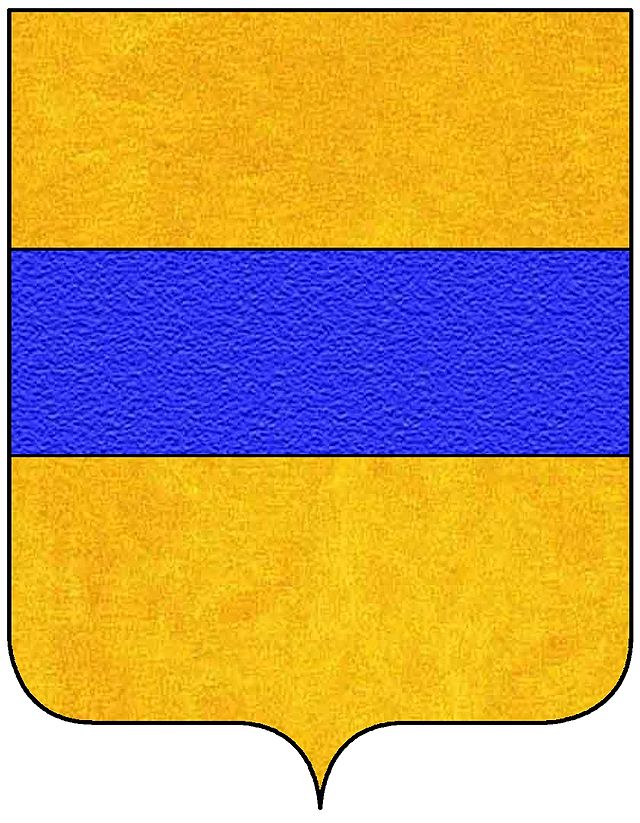
Avarna Heraldic Shield
He was Sicilian nobility, descendent of a long, illustrious line with a string of aristocratic titles: Duke of Gualtieri, Marquis of Castania and Baron of Sicaminò. His forbears held such positions as Minister of the Interior and President of the Council of Ministers in the Kingdom of the Two Sicilies, and Ambassador to the Austrian-Hungarian Empire and Senator for Life in the Kingdom of Italy. Born into this old-world aristocracy at a time of transition, he was part of the last generation, Downton Abbey on its way out.
The duke cut a striking figure, elegant and composed in dress and manner. As Tava likes to say, he was equally at home drinking champagne with his noble friends and doing manual labor on their property. Manual labor? A duke?
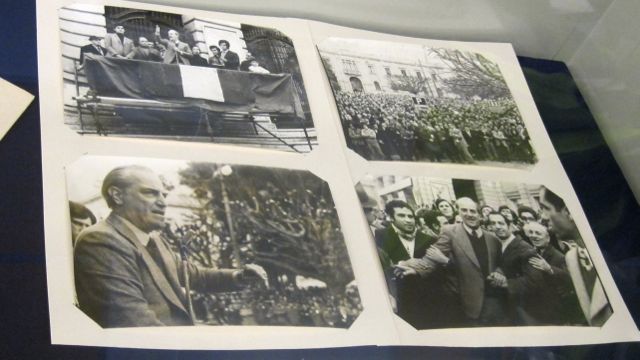
Duke Avarna speaking at a rally in Reggio Calabria, 1972
Looking back over the hundred years since his birth, the world and Italy have greatly changed and he of course was not immune to society’s transformation. The dashing young man who served in a cavalry division in the Second World War, married a woman from a wealthy family, had three children, and dedicated himself to writing, all with the financial security of his family’s estate, came up against the agrarian reforms, an estrangement from his wife and children, and an inheritance that didn’t land in his favor.
Financially, when forced to give up about 65% of the family’s holdings as part of Sicily’s land reform in 1955, the duke struggled with tax and other monetary obligations, changing his life from that time forward. A little over twenty years later, the fortuitous meeting in Rome between Tava and the duke would be another turning point for the nobleman.
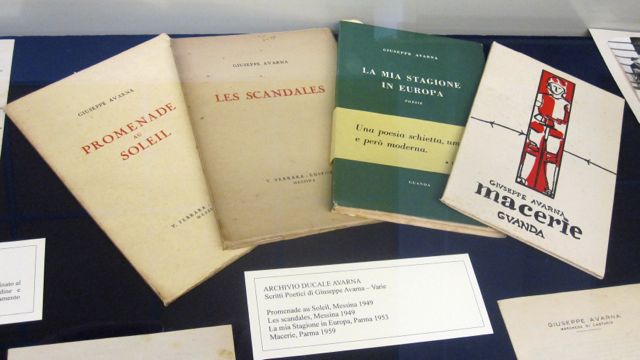
Poetry of Giuseppe Avarna: Promenade au Soleil, Les scandales, La mia Stagione in Europa, Macerie (1949-59), State Archives in Messina
THE BELL OF GUALTIERI SICAMINÒ
It was love at first sight and the two remained together until the duke’s untimely death. Their principal residence was the parish house that just happened to be right next door to the palazzo ducale, which would be the duke’s palazzo, except of course, the duke himself no longer lived there. However, his estranged wife and three grown children continued to occupy the residence, so the situation was definitely ripe for awkwardness. It took eleven years for his first wife to finally agree to a divorce and throughout that time, the situation was anything but tranquil between the family of Sicilian nobility and the duke together with the American flight attendant from Oregon.
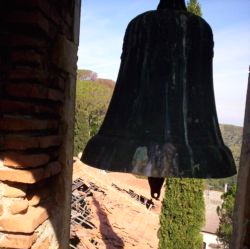
Bell in Sicaminò rung by Sicilian nobility
The tense atmosphere came to a head over the ringing of a bell, which was right outside the door of the parish house and just a stone’s throw from the palazzo. (The attached chapel had been deconsecrated years before.) One night when Tava and the duke were celebrating with friends, his wife and children registered an official noise complaint with authorities, citing in particular, excessive bell ringing intended to offend his wife “a morte” (to the maximum degree or literally, to the point of death).
The media took the story and ran with it. “A morte” became “amore” and thus the legend was founded. Whenever Tava and the duke made love, he celebrated with joyous bell ringing intended to impart the highest disrespect for and annoyance to his wife. Is there any truth behind the legend? And would it really matter?
There was a great love and there was also apparently a lot of bell ringing in Sicaminò, the abandoned village of the once thriving fiefdom in northeast Sicily. The court in Milazzo came down in favor of the wife, and he was ordered to pay a fine of 20,000 lire for disturbing the peace and forbidden to ring the bell in the future. However, the couple won in the appeals court of Messina, where the judges affirmed that ringing a bell at any time of day or night for whatever reason wasn’t a crime if you lived outside of a population center.
And so the bell rang and rang. The Italian newspapers and television shows ate it up, and the story even made its way to CNN. For Italian speakers, here’s a clip from an interview with the couple that appeared on Italian television: Enzo Biagi and the Duke of the Bells. After time, the wife acquiesced to a divorce, Tava and the duke got married in a civil ceremony in nearby Milazzo and she became the new duchess, and for many years one could have said that they lived happily ever after.
This unusual pair of Sicilian nobility tilled the land and harvested olives and fruit together. The duke continued to carry out his intellectual pursuits. They didn’t live in a big house or drive fancy cars, but were happy with the simple pleasures of life.
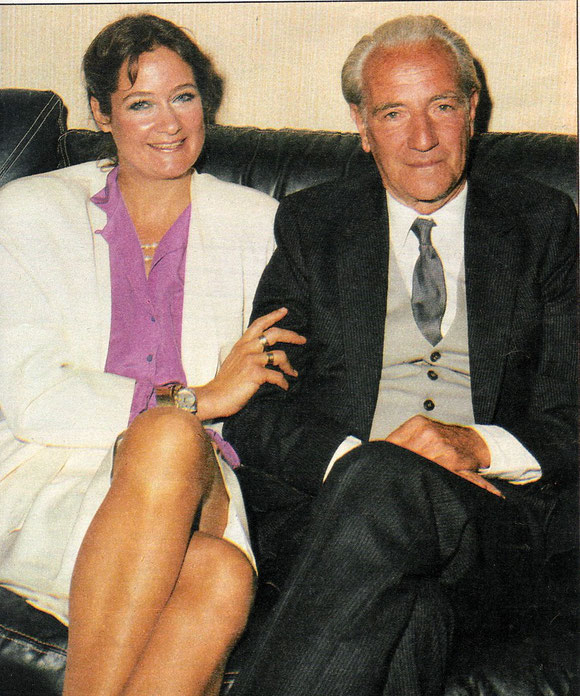
Duke and Duchess Avarna, Sicilian nobility
THE DUKE’S DEATH
Tava continued to work as a stewardess, organizing her schedule to have chunks of time off to spend in Sicily. The duke would meet her at the airport in Reggio, just across the Strait of Messina. Waiting for his bride, he chatted with the airport personnel and was said to be natural and unassuming, a good guy. One day in Rome as her flight was just about to depart for New York, she was called off and given the tragic news.
She returned to her home in Sicily to find it completely burned, the entire contents destroyed, a roofless shell of a building. Investigators came twice from Rome and found traces of accelerant, but no one was ever accused. Newspapers erroneously reported that the old duke had fallen asleep and a spark from the fireplace had jumped out, causing the blaze, only investigators found no evidence of a fire in the hearth. The opportunity was seized upon to rehash the story of the bell.
Tava was left with the ashes, their seven dogs and a couple of horses. She took the dogs and her title back to Oregon, as she had nowhere else to live. She hadn’t inherited anything, but she gave the dogs a good life in America together with her pet geese. The duke’s son had been bequeathed what was left of the estate, as the duke only had what is referred to as the usufrutto, meaning he could enjoy it while he lived. His granduncle had not been pleased with who his nephew had married and so he wrote his will for the inheritance to skip two generations, as he didn’t even want his nephew’s son to be the beneficiary. This punishment in the end only served to complicate issues and further tear the family apart.
Did someone want to kill the duke? Probably not. Did someone want to burn down his residence so he would have to go elsewhere? Most likely.
IL SILENZIO DELLE PIETRE
 Ten year’s after his death, Tava published a collection of his poems, those few that he had been able to toss out of a window during the fire and that she had salvaged amongst the rubble. Entitled Il Silenzio delle Pietre (The Silence of the Stones), the volume pulls from writings in the last few years of his life and with its publication Tava lovingly fulfilled one of her husband’s last wishes. Here is the link to Tava’s brief video about the book of poetry that features a few of the remaining photographs she has of the duke as well as of the two of them together.
Ten year’s after his death, Tava published a collection of his poems, those few that he had been able to toss out of a window during the fire and that she had salvaged amongst the rubble. Entitled Il Silenzio delle Pietre (The Silence of the Stones), the volume pulls from writings in the last few years of his life and with its publication Tava lovingly fulfilled one of her husband’s last wishes. Here is the link to Tava’s brief video about the book of poetry that features a few of the remaining photographs she has of the duke as well as of the two of them together.
100-YEAR COMMEMERATION OF THE DUKE
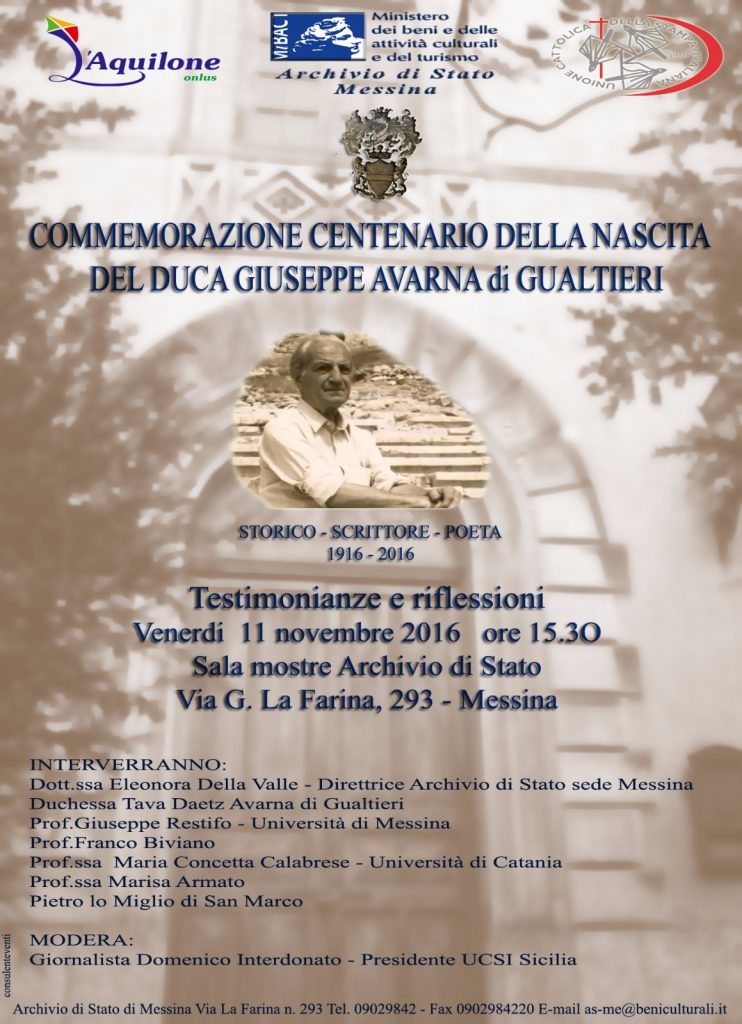
Commemoration Flyer for 100-Year Anniversary of Duke Avarna di Gualtieri’s birth, member of Sicilian nobility
Tava invited me to the commemoration of the duke’s birth this past November, and a couple of friends and I took the half-hour hydrofoil from Reggio Calabria to Messina for the event. It was being held at the Archivio di Stato, which sounded like an important place, and for its contents, I’m sure it is. However, I was surprised to discover that the state archives were stored in a non-descript building attached to a supermarket about two kilometers from the city center. Although the institution dates back to the 17th century, Messina’s many disasters, from earthquakes to wars, have made the securing of an appropriate, permanent home for the archives a challenge.
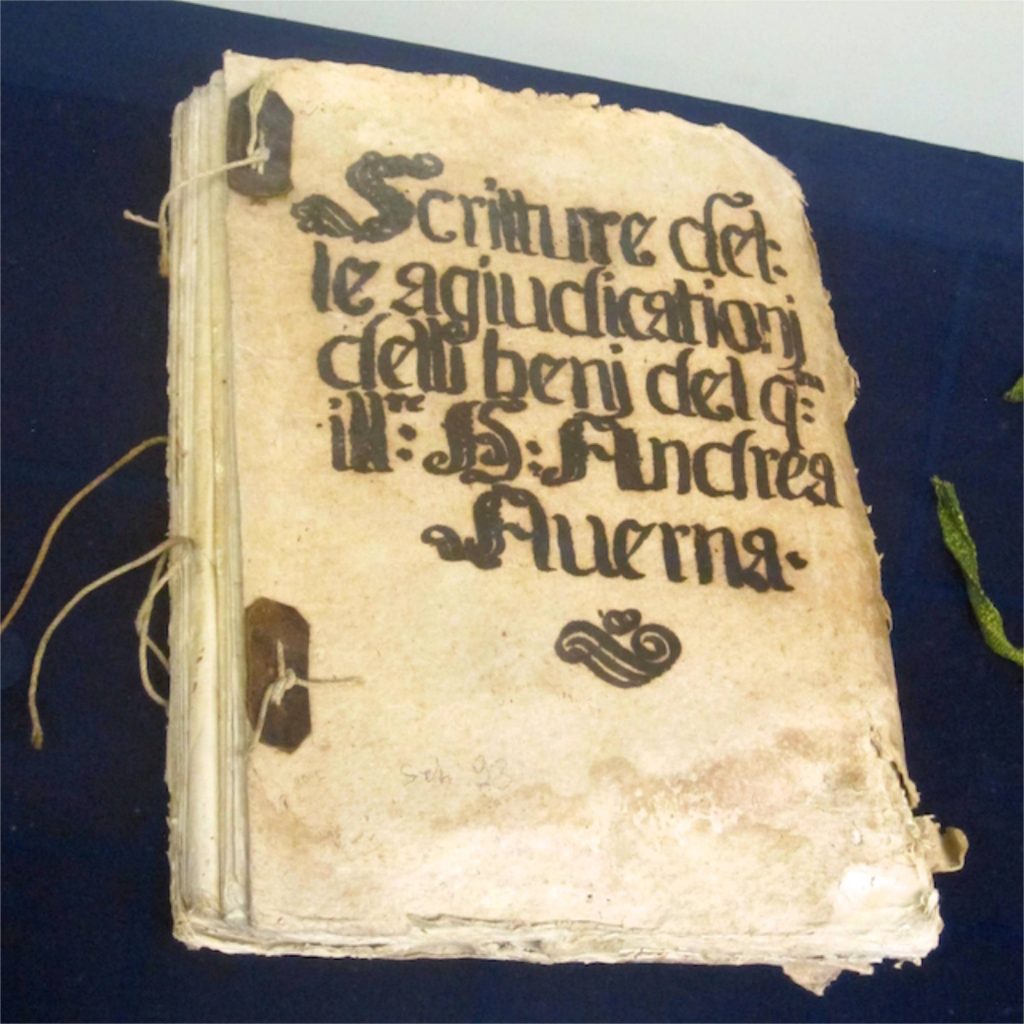
Avarna Ducal Archive, 1643-1682, Don Andrea Averna
The commemoration included testimony and reflection, and while there were a couple of university professors who lent historical context with regard to the family’s longevity and position, the speakers who really held the attention of the audience were those who recounted their personal experiences and impressions of the duke. During the program, I learned that he had written prolifically throughout his life, having published numerous volumes of poetry, several in French, as well as those on current topics of the day, lent his voice to politics and founded a small magazine. The archives also had a great number of family documents that ranged from the 16th-century through to recent times.
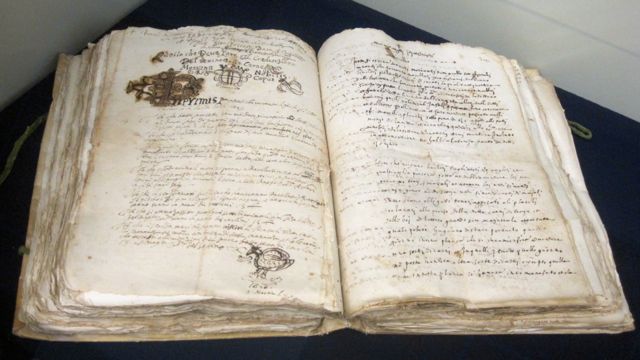
Avarna Ducal Archive, 1595-1619, Messina, Don Nicolo’ Avarna
One of the duke’s friends, Pietro Lo Miglio di San Marco reminisced as to his character, always sincere with a view to the big picture, a man who took adversity in stride. And naturally, Tava spoke warmly of her husband, still choking up even after so many years. Money didn’t mean anything to him. People, a good meal, animals and nature were his principal interests. (They even kept turtles in the house.) And he loved to laugh.
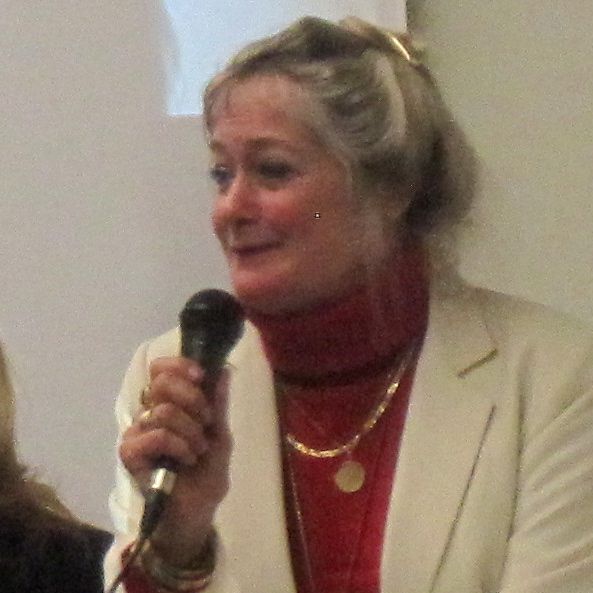
Duchess Avarna di Gualtieri
These two people, who would have seemed so different judging by their respective resumes, actually had a lot in common, except perhaps for their views on listening to poetry being read aloud. Several years ago, Tava made a short video entitled the Duca Avarna, in which you can see the property and the abandoned village of Sicaminò, photos of the couple and of the duchess ringing the famous bell. (Video of the Duca Avarna, Sicilian nobility)
TRUE SICILIAN NOBILITY
The duchess was very happy we came. Heads turned when we started to speak English together. We were friends of the duchess. In a very real way, we had a connection to the duke himself.
Why does their story pique so much interest? Royalty, the age difference, their free spirits, or just a vicarious pleasure? The media stereotyped the story and its players. All you need is an older aristocrat and an attractive young foreigner, but the reality is that the duke and my friend, the duchess, weren’t just any two people. They both made great sacrifices to be together, except to them, it wasn’t a sacrifice at all. For them, it was meant to be. My friend was born to be a duchess. Tava is true Sicilian nobility.
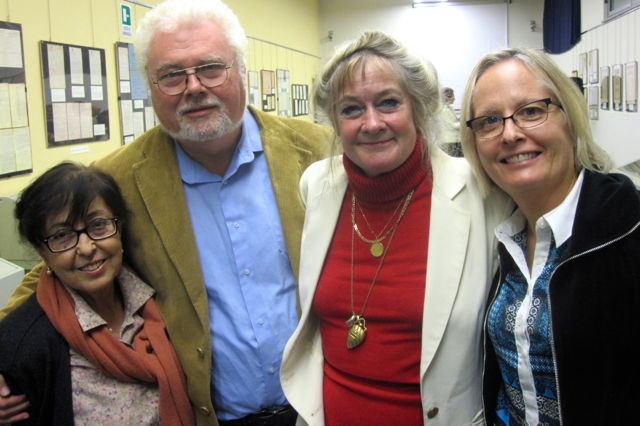
Luisa, Gareth, the duchess and the author
As in my personal interactions with people throughout Italy, this encounter with Sicilian nobility showed yet another aspect of the rich cultural fabric that makes up this fascinating country. Living, working and traveling in Calabria for four years, I was inspired to write about the region in the toe of the boot, Sicily’s closest neighbor. My non-fiction, award-winning book, Calabria: The Other Italy explores daily life, culture, history, the arts, food, society and tourism of this lesser-known, southern region. And my journey continues with Basilicata: Authentic Italy. They’re available in paperback and electronic versions.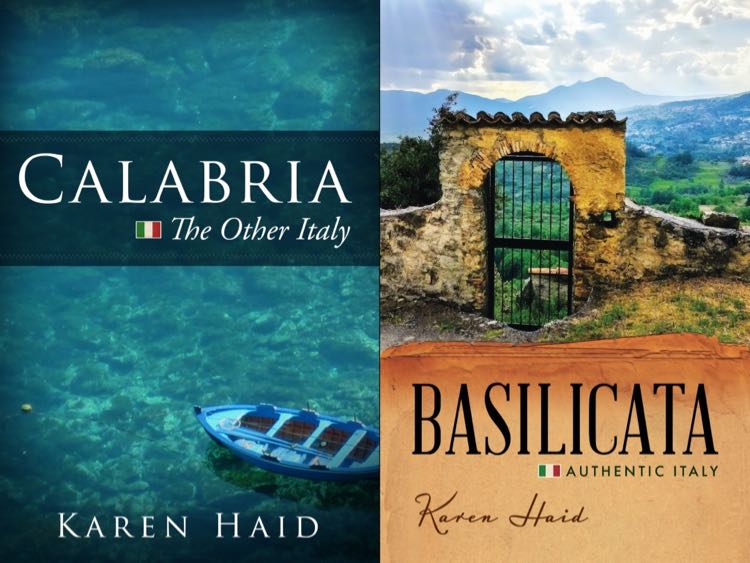

Comments 19
What a wonderfully romantic story! I thoroughly enjoyed reading this. Your aristocratic friend, Tava, sounds like an interesting and lovely person. Thanks for sharing this Karen.
Author
Yes, she most certainly is. I’m glad you enjoyed her story.
A beautiful story! Some loves are destined to BE!!!! 💕💖
Author
Yes, from that first moment on Via Veneto when Tava turned around…
What a touching story, beautiful and heartbreaking at the same time.
Author
It would appear that they didn’t choose the easy street, although clearly for them, the most important thing was to be together.
Thank you for sharing your friend’s story and through her Giuseppe Avarna di Gualtieri’s poetry. The more stories I hear and witness the more I am reminded that, prince or pauper, we are all fighting various personal battles in our own way, and sharing them helps us empathize with one another’s struggles.
Author
Tutto il mondo è paese, as they say in Italian. (It’s the same the whole world over.)
I suppose your article about Tava and the Duke is the real and delicate story of a true love.
Author
Definitely, the real thing …
Such a beautiful but sad story!
Author
It’s great that they lived in the moment and were able to have many years together. Unfortunately, love stories don’t always have a happy ending …
A beautiful love story!
Author
That, it is – glad you enjoyed it!
My Great Uncle worked for the Duke from what my father told me as a cook and bodyguard. My father was born in Gualtieri and left in 1947 to America. I have a photo of the castle but wish I had more photos with better views. My family enjoyed listening to my fathers stories about life in Italy and talked about the Duke as well.
Author
Very interesting. This duke would have been 31 when your father left. It’s amazing how much history must have transpired in the town of Gualtieri Sicaminò with the local royalty and the fascinating time period of which your family took part. Thank you for your comment.
I met Tava on a Pan Am flight from London to San Francisco. Our take-off was delayed by about two hours by mechanical problems. I was in first class and had a reservation for the restaurant upstairs on the 747. Seated for a wonderful dinner, we were served by one of the most beautiful women I ever met. I sipped cognac after dinner while the other diners went back downstairs. Tava sat with me, and we had an amazing conversation. I was overwhelmed with attraction, but always a polite gentleman. The flight cleared customs in Seattle, but when I tried to stand up, my legs collapsed. There were several stewardesses with cold towels, and maybe a half dozen passengers with food poisoning from the appetizers that sat in an oven during the delay. I was conscious but only partly aware, and Tava found a wheelchair, dug in my suit coat for my passport, cleared me through customs, and flew on to San Francisco, taking care of me. I was embarrassed by the barf bags I had to use, but I recovered enough to continue the conversation with my angel. She wrote her phone number for me, and I thought we would have more time together, but I could never reach her again by phone. I was sad to stumble across the love story with the duke years later, but he was truly blessed to share his life with Tava.
Author
What a beautiful memory, and amazing to retain such a vivid image of your meeting and the feelings evoked after what must be a lifetime. Clearly, you, the duke and no doubt countless others appreciated Tava on many levels. Up until the sick bag, traveling in first class with Pan Am sounded quite elegant, indeed. Passengers sitting in coach would have most likely assumed that upper class travelers always ended happily ever after with the attractive stewardess. Not to say that a magical moment couldn’t be had by those seated in economy, perhaps not in a restaurant at 35,000 feet, but sipping a smoothie at an airport kiosk. After Pan Am dissolved, Tava continued to provide her characteristically attentive service to passengers with Delta. Perhaps this blogpost will be your connection. Or one day, you’ll board an international flight to Italy, you’ll turn to greet the woman seated next to you, and it will be your angel…
Thank you Ms Karen for sharing this amazing, bittersweet story about your friendship with the Duchess Tava. Brought a tear to my eye, and will always mean quite a lot to me. Please give her my very best regards when next you connect. Thanks again, and best wishes to you.